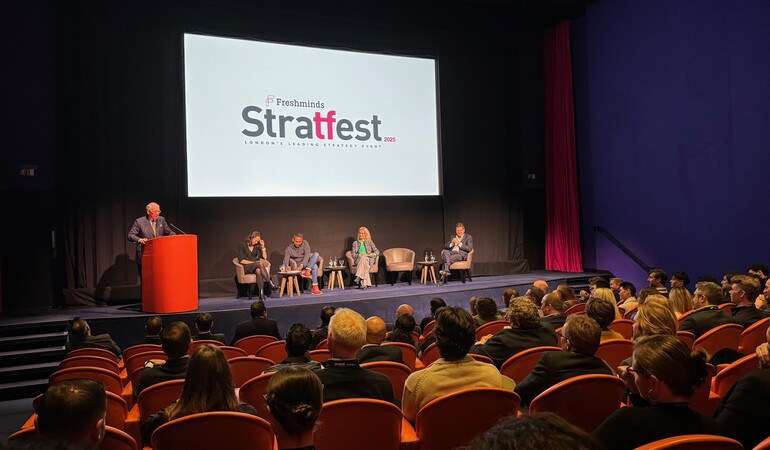“Ten years in the era of Gutenberg is ten seconds in the era of Zuckerberg,” remarked broadcaster Amol Rajan, capturing the dizzying pace of technological and societal change that framed this year’s StratFest.
On 7 October, Freshminds kicked off another night of idea sharing for strategy leaders with four incredible speakers. The 2025 theme, “What’s next?”, was deliberately open-ended, capturing the uncertainty of the future.
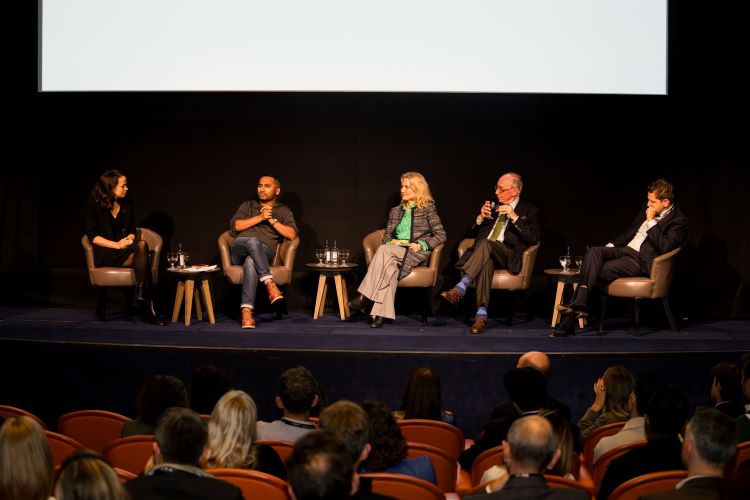
In this year’s program, an anticipated thought leadership event in London, four speakers tackled that challenge from four angles: technology, media, markets, and geopolitics. Each offered a different lens on how the future is unfolding.
Parmy Olson - author and Bloomberg technology columnist, speaking on tech
Amol Rajan - broadcaster, journalist and presenter of Today, covering the media
Anna Macdonald - fund manager at Aubrey Capital Management, commentating on the markets
Sir Malcolm Rifkind - British politician and ex-Foreign Secretary, presenting on geopolitics
Here’s what they had to say.
Parmy Olson on tech
Parmy opened the evening with a message that set the tone: There is so much more to this story, the story of how we create, adopt, and adapt to new technologies.
On AI, she noted that while the field began with noble intentions from creators, it has largely now been absorbed, perhaps even hijacked, by a small number of powerful corporations.
The question lingered: Are we in an AI bubble? Is it delivering help, or hype? Despite public enthusiasm, an MIT study shows most generative AI tools have yet to deliver tangible profit or productivity gains, reflecting a familiar lag as businesses take years to adapt, even while consumers adopt much faster.
Power, capital, and cultural contrasts
Drawing parallels to the dot-com boom, the speaker noted that today’s AI wave is again fuelled by capital markets and private investment - but countries are tackling this in different ways.
A striking example came from China, where the artificial intelligence company, DeepSeek, released its model freely, revealing a culture of openness and collaboration.
In contrast, Silicon Valley’s ecosystem remains concentrated in the hands of tech giants dominating the S&P 500, creating what the speaker called “an entrenchment of power.”
One-third of academic AI research now involves big-firm affiliations, a trend that stifles competition and disadvantages Europe’s innovation landscape. Tech firms in the West feel duty-bound to maximise shareholder returns, but is this stifling creativity?
Rethinking progress and responsibility
When Sam Altman spoke about the launch of AI video app Sora, he described it as a “Cambrian explosion of creativity”.
Referencing this comment, the speaker cautioned that AI’s promise often feels more like social media’s pull, designed to keep us scrolling rather than creating. Yet there’s a “healthy scepticism from the public,” a hopeful sign that users are demanding more transparency and responsibility.
The session closed with a reminder that the next phase of AI development must prioritise safety, trust, and human-centred design, or risk repeating the mistakes of past tech revolutions. In this aspect, the UK has a chance to lead on policy, but only if it acts quickly.
Amol Rajan on media
In a wide-ranging and provocative talk, broadcaster and journalist Amol explored how media, technology, and society are reshaping one another in what he described as “a crazy and bewildering era”.
Blending humour, sharp analysis, and historical perspective, he questioned whether we’re truly experiencing progress, or simply acceleration without direction.
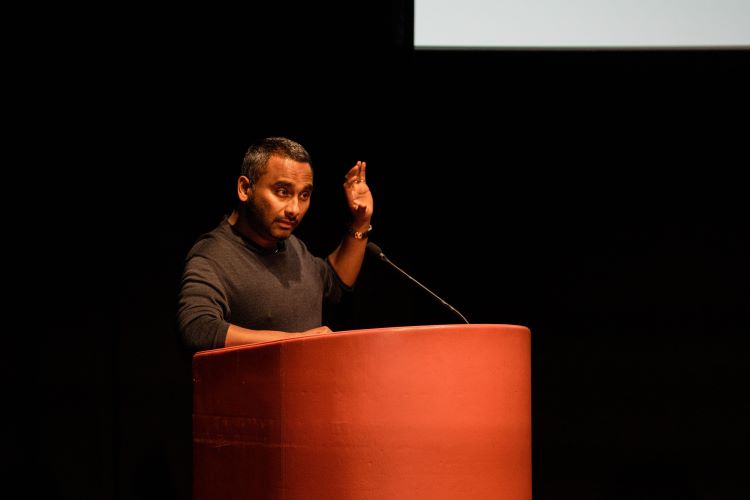
From Gutenberg to Zuckerberg
As America retreats from the world it once built, we’re witnessing rapid, disorientating change, as flagged by Amol - “ten years in the era of Gutenberg is ten seconds in the era of Zuckerberg.”
While some call this the Great Acceleration, Amol argued we’re actually living in a period defined by volatility, conflict, and confusion. From demographic shifts and climate change to the rapid rise of Asia, our world is being reshaped faster than our institutions can adapt.
The power shift: From institutions to individuals
One of the most striking changes is the massive transfer of power from media institutions to individuals. Where columnists and editors once shaped public discourse, today, influence rests with creators and commentators. “We’re moving from curators to creators,” Amol observed.
British newspapers are losing their grip, while a few digital voices dominate attention. This democratisation is liberating in theory. But not everyone has a platform, and with it comes what Amol called “a collapse of the public domain.” The shared civic space where ideas once met is fragmenting.
Technology’s grip and the golden age of stupidity
Amol warned that humanity’s relationship with technology has inverted: “We used to use tech to master our environment; now tech is mastering us.”
Platforms like YouTube (which has 2.7 to 2.9 billion monthly active users) shape what we see, and therefore to some extent, how we think and the opinions that we form. A massive 72% of content served to individuals is driven by an algorithm, rather than choice. The dominance of short-form content has ushered in a “golden age of stupidity,” where literacy and deep reading decline.
Anna Macdonald on the markets
In a sharp and candid session, Anna explored the shifting landscape of global markets, contrasting U.S. momentum with Europe’s ongoing struggle to regain economic confidence.
A year on from her last analysis, she noted, “it actually feels very similar”. Uncertainty persists, but so does opportunity.
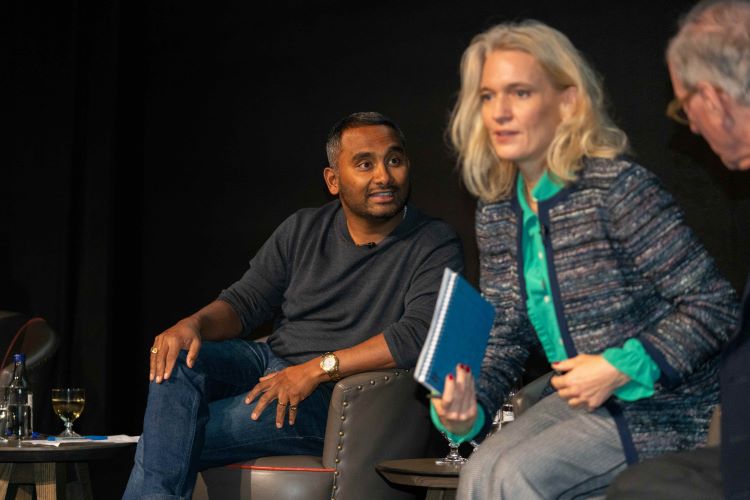
Opportunity over uncertainty
Anna challenged a familiar assumption: “Markets don’t hate uncertainty, they hate a lack of opportunity.”
Despite global instability, U.S. firms continue to extract more value from both labour and capital. Investment growth in the U.S. is running at 4-5% this year, far ahead of Europe. “Europe isn’t really back yet,” she cautioned, pointing out that GDP per capita remains roughly half that of the U.S. The imbalance underscores a widening transatlantic divide in productivity and optimism.
AI, investment, and the return problem
Artificial intelligence, Anna observed, is being treated as a “bit of a saviour.” Future 500 companies are pouring between $30 - 40 billion into AI initiatives, yet 94% have so far seen no measurable return on investment.
Some $325 billion has already been committed to data centres by 2030, but without clear payoffs, investment enthusiasm could fade. Meanwhile, the so-called Magnificent Seven tech giants, Apple, Microsoft, Amazon, Alphabet, Meta, Tesla, and Nvidia, continue to dominate market valuations, reinforcing the concentration of wealth and innovation in a handful of U.S. firms. We are hearing more about the “AI bubble”, how this could destabilise the markets, and whether that poses a risk or opportunity for Europe. The future looks more uncertain as 2025 ticks along.
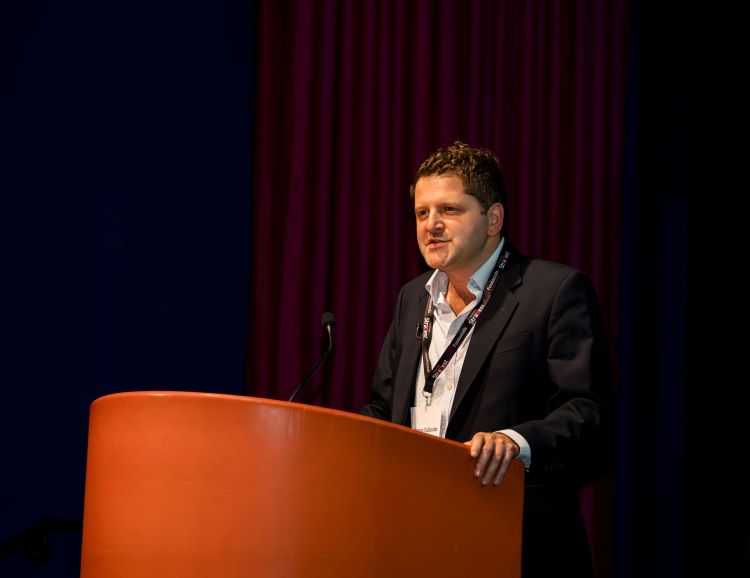
The UK’s Structural Malaise
Turning to the UK, Anna urged businesses to “crack on” rather than wait for economic reforms to materialise. The recent budget, she argued, failed to inspire confidence. With a shrinking workforce, rising debt, and an ageing population, fiscal pressures are mounting, and pension costs alone threaten to mirror France’s 14% of GDP.
“We now spend as much servicing debt as we do on defence and education combined,” she concluded.
Sir Malcolm Rifkind on geopolitics
In a thoughtful and historically grounded session, Sir Malcolm explored the turbulent dynamics shaping today’s geopolitical landscape, from the trauma of Gaza and China’s expanding influence to the disruptive force of the Trump presidency. While acknowledging that “it’s easy to be pessimistic,” he argued that much of what we are witnessing today can be traced back to a pivotal moment in modern history: the year 1989.
1989 and the roots of modern disorder
Sir Malcolm identified three interlocking events in 1989 that reshaped global power:
The end of the Cold War
The collapse of communist ideology
The fall of Europe’s last empire (the Soviet, or Russian, empire).
These seismic changes ushered in a new global order that initially promised peace and progress but has since given rise to instability and fragmentation. Many of today’s crises, from regional conflicts to populist politics, are rooted in the unresolved consequences of that era.
China’s rise and the shifting balance
Central to Sir Malcolm’s analysis was China’s ascent. The country, he noted, describes itself as practising “capitalism with Chinese characteristics.”
Its growth challenges long-held Western assumptions about economic and political models. “In relative terms, the West is declining,” he said, not through collapse, but through stagnation as other regions surge ahead. In this sense, China is entitled to claim its place as a global superpower.
America’s power and the Trump phenomenon
Turning to the United States, Sir Malcolm reflected on the phenomenon of Trump, a leader wielding “brute force” because America remains uniquely powerful. The key question, he posed, is not whether U.S. dominance will end, but when and how it will evolve in a world where other powers are rapidly catching up.
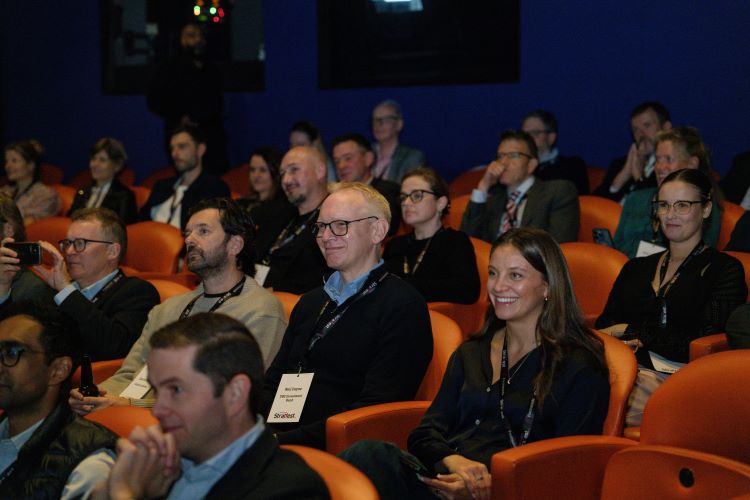
Why StratFest?
Freshminds, now celebrating its 25th year, produces StratFest as a thought-provoking, opinion-forming forum for its wide network of clients and associates. It’s one evening of the year where senior strategy and business leaders can meet and discuss what’s on the horizon, and share thoughts and experiences. It’s become the highlight of our calendar and a thought leadership event that many executives look forward to.
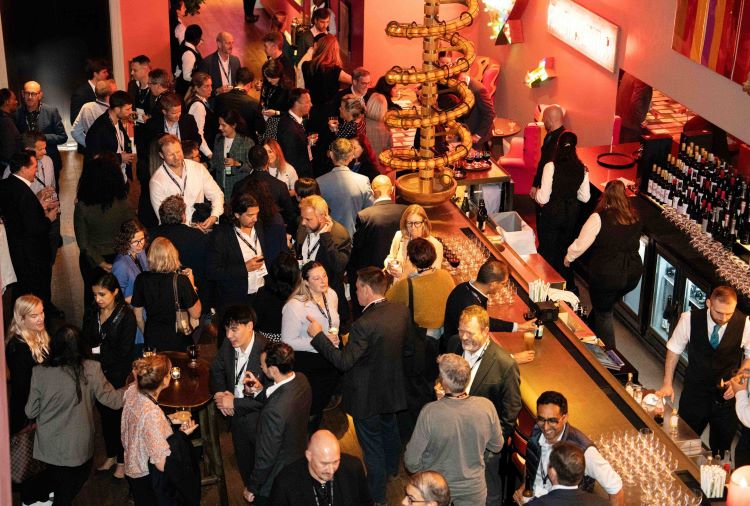
Hosted by Freshminds MD James Callander, StratFest 2025 has been one of the more thought-provoking in the series.
Want to stay in the know? Get in touch with Freshminds for more insights on the ideas shaping the future.
